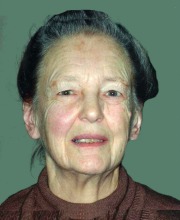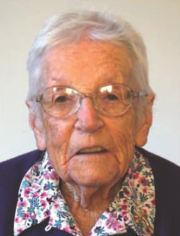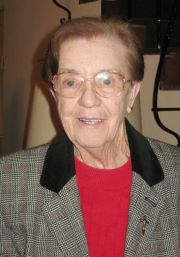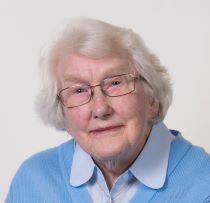
 Sister Thomasina Cosgrave
Sister Thomasina Cosgrave
1934 – 2014
Born: 10th March 1934
Entered Religious Life: 27th June 1955
Died: 20th June 2014
An appreciation of Sr Thomasina Cosgrave
The reflection given by Sr Úna O’Neill RSC at the Eucharistic Celebration
to celebrate Sr Thomasina’s life and death
Gardiner Street Church Dublin
24th June 2014
Everything about the Liturgy today reflects the faith and fidelity of the woman whose life we are celebrating. She would be delighted to see so many gathered here this morning: her family whom she loved so well and who have been so faithful to her down through the years, the Sisters who shared her life and commitment, her co-workers and many friends, her students and associates. We all have our memories of her but in a very real sense she was much more than the sum of them. The Readings point us to a deeper remembering . . . remembering so that we can learn from her and give thanks to God for her and for the extraordinary gifts she shared so generously throughout her life.
In the second reading we are told: “Think of the love that the Father has lavished on us “. Thomasina lived that love every day of her life – a love that led her from home and family in Co. Meath to Milltown in Dublin, to Kilkenny and Cork, to Chester in England, to St. Vincent’s, Crumlin, Baldoyle, Lakelands, Basin Lane, Harold’s Cross and finally these last years to Temple Street.
Thomasina had a heart that embraced all who were on the margins and a love that knew no boundaries. She also had an imagination that devised many schemes to get what she thought was needed for those whom she served. Sometimes her schemes went beyond comfortable boundaries but always, always her intent was to serve others. She had little patience with systems that did not serve her purposes and it is amazing how many agencies and individuals yielded to her persuasions when she needed to bypass rules and regulations!
She was a rare woman in that in that she had little or no appreciation of her own giftedness and generosity (though she was very definite in her opinions!). She rarely thought of herself or her own needs. She never looked for adulation or praise and when it was offered she dismissed it immediately. And, like all of us, she suffered. She suffered particularly in her efforts to understand and live her life as well as she could and she suffered in her sense of helplessness in the face of other’s suffering and pain.
At the same time she was well able to celebrate and we remember her happiness at the celebration of her golden jubilee some years ago and her 80th birthday last March. Among other things she loved her involvement with the Association of Remedial teachers and travelled enthusiastically to all their conferences and meetings. She enjoyed the theatre and good literature. She loved a good discussion but what she called discussion many of us would have called argument! She would be provocative in her comments in order to get a reaction and it was interesting to watch the uninitiated rise to the challenge only to lose out to her conviction that she was right! Poetry was always a consolation and inspiration for her. In recent weeks she found consolation in a poem by Des Hartford called Briared Daffodil. The last four verses read:
Suffering transformed
The Risen Lord lives within
Like briared daffodil bursting forth.
Believe and be at peace.
In the Gospel we are told: “Do not let your heart be troubled and do not let them be afraid” and that was true of Thomasina’s final weeks. She lived these past two months with grace and gratitude. Her desire to remain with the community in Temple Street was readily fulfilled and Sr. Helen and the Sisters there gifted her with a care and compassion that respected her freedom and her choices. She had many visitors, especially from her family and friends and those visits brought her great happiness. But being Thomasina she also had a number of projects to complete before she died and this she accomplished. She also wrote numerous thank you cards to many of her friends and students. About three weeks ago she still had 30 to write!
And then she was ready to go. And in her going, the Lord fulfilled his promise, made in today’s gospel, and she was peaceful to the end. She was intrigued at the blending of two worlds – this one and the next. She used the image of crossing a bridge: she was walking confidently across, and while the other side was shrouded in mist, she was happy to keep going because she sensed that on that other side she would indeed, in the words of the Psalm, find green pastures, contented repose and that she would want for nothing.
She crossed the bridge on Friday morning, yielding her spirit to the Lord, peacefilled and content – blest with a death that had no struggle, no pain, no fear. Her longing for understanding is now fulfilled. In the letter of St. John we are told: “I know that my Redeemer lives . . . When I awake . . . I shall look on God. These eyes shall gaze on Him and find Him not a stranger but a friend.” She chose that passage because it contains the promise that in death the mystery of life would be revealed and one can only imagine her relief and wonder and delight when at last she looked on God and found him not a stranger but a friend.
In recent times she revisited a passage from Karl Rahner which expresses that longing and I will quote it now:
God will be the final word…
Then will begin the great silence
in which no other sound will be heard
but you O Word resounding from eternity to eternity. . .
Being and knowing, understanding and experience
will have become one and the same. . .
No more human words, no more concepts,
no more pictures will stand between us.
You Yourself (O God) will be the one exultant word of love and life filling out every corner of my soul.”
(Prayers for a Lifetime, p. 18.)
We pray that God is now the one exultant word of love and life filling out every corner of her being.
May she rest in peace.
Sr. Joseph Helen Cunningham.
We are standing this morning on holy ground: the place where Mary Aikenhead spent the last years of her life as an invalid – a woman whose vision, courage and practical common-sense gave birth to our Congregation and to our long and graced history of service of the poor, the weak and the vulnerable.Today we are celebrating the life of Sr. Joseph Helen, a woman who cherished that charism, serving those in need with fidelity and generosity, and who also spent the last years of her life here in the Hospice.
The readings this morning are both comforting and challenging.In the Gospel Jesus speaks of himself as the Way, the Truth and the Life.He invites us to put our hope and our trust in Him and in His promise to be with us, steadily and constantly as we try each day to walk his way, to speak his truth, to live his life.It is an apt description of the life and commitment of the woman whom we are remembering here.
In her 103 years of life, Sr. Joseph Helen lived through historical and global changes that are impossible for us to imagine.She experienced seismic shifts in Church and state.She witnessed wars and famines on a world scale.Through all of those yearsshe remained steadfastly faithful to the constant core of who she was as an RSC.She was born Dorothy Cunningham in Ballacolla in Portlaoise on 1st July 1908. She was an only girl, with one brother, and was much loved by all.Her childhood and youth reflected the calm ordinariness of children’s lives at that time.Following her degree studies she spent some months caring for her mother who was ill and then secured a job teaching in Mountjoy St. School in Dublin.Her father was not impressed!His comment on hearing of that place was:“It doesn’t sound like much of a job but you like working for the poor and you’ve always been good at it”.She remained there until she entered the Sisters of Charity on 5th October 1931.
In the first reading we are told that God gives strength to the wearied; that those who hope in Yahweh will soar like eagles, run and no grow weary, walk and never tire.That was so true of J. Helen throughout her active life.She was missioned back to Mountjoy St. after her religious profession and taught there for 12 years.Following a year’s further study in Scotland, she went to teach in a Secondary Modern school inWalthamstow in England for a year.And then came the call to be one of our three founding Sisters of the Zambian Region, or Northern Rhodesia as it then was.
In 1948 they set sail, travelling for four weeks by boat – The Athlone Castle -rail, bus and lorry before arriving in Chisekesi Siding on a dark morning on 28th October 1948. Sr. Helen kept a diary of the journey which was printed for the 50th anniversary and which gives a fascinating insight into their journey and how they coped with, what was for them, such a strange and almost ‘alien’ environment.
One can only imagine the anticipation and anxiety, the challenge and the loneliness, the wonder and the doubts that marked that journey and her first months in Zambia.It was a place and people that she came to love and cherish.She committed herself to the education of girls and brought the gift of knowledge and freedom to countless women who still remember her with gratitude and appreciation.There are many past pupils with sad hearts in Zambia at the moment – their sadness at her passing tempered only by their gratitude that she is free from the debilities of her age.And that mourning is echoed this morning among our sisters there in the Region and here in this Chapel in the sisters who lived with her and shared her life for those 30 years.
Her first 15 years in Zambia were spent in the Teacher training college run by the Jesuits and began her work in promoting the education of girls – beginning with the setting up of a girls secondary boarding school in Roma in Lusaka.Nine years later she was appointed Regional Leader and on Independence day 1978she was conferred with the Order of Distinguished Service for 30 years of outstanding service to the people of Zambia in the fields of Education and Social work.
While she was a formidable woman in many ways, with high standards and expectations, her devotion to her religious life and her commitment to education was recognized and appreciated by all who knew her.She was a strict disciplinarian, spoke the truth without apology and demanded very high standards.At the same time her heart was compassionate and her generosity and hospitality were known and appreciated by all.
Like all of us, Helen has known suffering and joy, tears and laughter, pain and happiness, loneliness and friendship.And she had strong relationships with herfriends – too numerous to mention – but exemplified in the love and devotion of Sr. Mary Bernadette Collins and Catherine Fallon.Up to the end she valued and enjoyed her relationships with her nieces, nephews and other family members and followed their lives with interest, with love and with prayer.
In 1978 she was missioned to Ireland and worked on our Constitutions.Subsequently she was appointed as local leader to our community in Crumlin before her appointment to our Provincial Leadership team and consequent arrival here in Our Lady’s Mount in 1981.
Sr. J. Helen’s commitment to Mary Aikenhead’s charism was single-minded and she never compromised on that.The second reading confirms her attitude to life:nothing outweighs the supreme advantage of knowing Christ Jesus. It is only through Him, with Him and in Him that we can find life and happiness and fulfilment.Rooted in that conviction, she endorsed and embraced anything that served the people for whom she cared in a better, more dignified or respectful way.
She suffered in her growing debility and weakness these last years and all of us – family, community, friends and colleagues – were saddened as we watched her suffering and her struggle to cope.In spite of the wonderful, caring staff who surrounded her and the sisters and friends who were her constant support,she had difficult and dispiriting days.Yet she never gave up .Her faith in Providence was the touchstone of her life.In the midst of all her pain and letting-go she was confident that he was with her, holding her, comforting her and in the end, calling her to himself.And when that call came, sheyielded her spirit to the Lord, peace-filled, calm and trusting – blest with a death that had no struggle, no pain, no fear.And perhaps I can end with some words of hers, written in the diary of which I spoke, on her arrival in Chikuni:“Now that we have reached our Promised Land we must thank God and Our Lady for our very pleasant and on the whole easy journey which we have had . . . . “Those words echo, not only the journey to Chikuni, but her life journey, now at its end as she moves, we believe, into the fullness of the Promised land of God’s life and love.

 Sister Thomasina Cosgrave
Sister Thomasina Cosgrave





